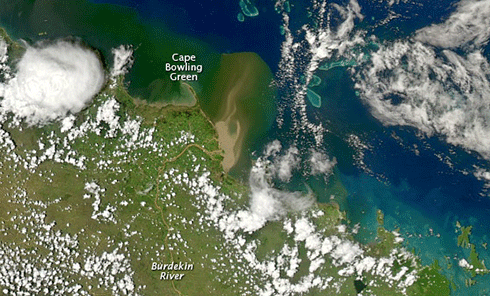 [Ecos 26 August 2013] — A 2013 Scientific Consensus Statement on ‘Land use impacts on Great Barrier Reef water quality and ecosystem condition’ has found that the health of key Great Barrier Reef ecosystems is deteriorating due to ‘continuing poor water quality, cumulative impacts of climate change and increasing intensity of extreme events. Mean-annual modelled loads of photosystem II inhibiting herbicides, namely ametryn, atrazine, diuron, hexazinone, tebuthiuron and simazine, are estimated to range between 16,000 and 17,000 kilograms per year. The total pesticide load to the Great Barrier Reef lagoon is likely to be considerably larger, given that another 28 pesticides have been detected in the rivers. The Statement was developed by an independent group of scientists, with oversight from a Reef Plan science panel. The group of scientists – including some from CSIRO’s Water for a Healthy Country and Sustainable Agriculture Flagships – reviewed and synthesised recent scientific findings on water quality in the Great Barrier Reef to reach a consensus on current understanding. They found that ‘the main source of excess nutrients, fine sediments and pesticides from Great Barrier Reef catchments is diffuse source pollution from agriculture’. ${imageDescription} Comment
[Ecos 26 August 2013] — A 2013 Scientific Consensus Statement on ‘Land use impacts on Great Barrier Reef water quality and ecosystem condition’ has found that the health of key Great Barrier Reef ecosystems is deteriorating due to ‘continuing poor water quality, cumulative impacts of climate change and increasing intensity of extreme events. Mean-annual modelled loads of photosystem II inhibiting herbicides, namely ametryn, atrazine, diuron, hexazinone, tebuthiuron and simazine, are estimated to range between 16,000 and 17,000 kilograms per year. The total pesticide load to the Great Barrier Reef lagoon is likely to be considerably larger, given that another 28 pesticides have been detected in the rivers. The Statement was developed by an independent group of scientists, with oversight from a Reef Plan science panel. The group of scientists – including some from CSIRO’s Water for a Healthy Country and Sustainable Agriculture Flagships – reviewed and synthesised recent scientific findings on water quality in the Great Barrier Reef to reach a consensus on current understanding. They found that ‘the main source of excess nutrients, fine sediments and pesticides from Great Barrier Reef catchments is diffuse source pollution from agriculture’. ${imageDescription} CommentEC13197_Fa.gif